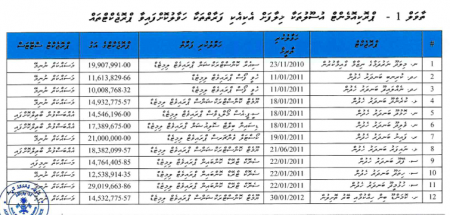Chief Justice Ahmed Faiz alleged in 2010 that judges on the interim Supreme Court “openly accepted bribes”, advising then-President Mohamed Nasheed to “bring the interim court to a halt,” Nasheed has claimed at a campaign rally in Male’ last night.
In 2010, then-interim Supreme Court Justice Faiz requested an audience with the president, Nasheed explained, noting that it was the first time he had met with a sitting judge.
“Faiz came and said the judges on the interim Supreme Court were openly accepting bribes and that Faiz knew of it,” Nasheed said.
He named the judges who were accepting bribes, Nasheed added.
“Faiz told me that the work that went on in the interim Supreme Court was not establishing justice but buying and selling. He said the court must be brought to a halt,” he continued.
Faiz advised the president that he was obliged to rein in the interim court, Nasheed said.
Interim bench
 Nasheed referred to the five-member interim Supreme Court – headed by interim Chief Justice Abdulla Saeed – declaring that it was permanent ahead of the constitutional deadline for the interim period on August 7, 2010.
Nasheed referred to the five-member interim Supreme Court – headed by interim Chief Justice Abdulla Saeed – declaring that it was permanent ahead of the constitutional deadline for the interim period on August 7, 2010.
Apart from Faiz, the interim bench sworn in on September 18, 2008 consisted of Justice Abdulla Saeed, Justice Mujthaz Fahmy, Justice Abdulla Areef, and Justice Yousuf Hussain.
Nasheed noted that the then-ruling Maldivian Democratic Party (MDP) did not have a majority in the People’s Majlis, through which the permanent Supreme Court was to be instituted.
Referring to Justice Ali Hameed’s sex tape scandal, the former president revealed that his first seven nominees to the apex court did not include “disgraced judges.”
The original candidates included sitting MPs and a relative of former President Maumoon Abdul Gayoom, he added.
Nasheed alleged that Jumhooree Party Leader Gasim Ibrahim offered an unlimited amount of money to MDP parliamentary group leader Ibrahim Mohamed Solih in exchange for confirming Ali Hameed to the Supreme Court bench.
On August 7, 2010, when the constitutional interim period expired, President Nasheed ordered the military to confiscate the keys of the Supreme Court after the interim court declared itself permanent.
Three days later, parliament hastily passed the Judges Act and approved Nasheed’s nominees to the new Supreme Court bench in a deal reached with the then-opposition parties who controlled parliament.
The president’s member on the Judicial Services Commission (JSC), Aishath Velezinee, described Faiz at the time as “a well-respected man amongst the judges. I have never heard anybody question his independence or impartiality. He is a learned man and amongst all the politicking and hanky-panky going on, he has maintained his integrity.”
Nasheed meanwhile went on to severely criticise Faiz for issuing a harshly worded statement condemning international partners who expressed concern with the Supreme Court’s controversial removal of the Elections Commission’s chair and deputy chair.
The Supreme Court was “destroying the future of generations to come,” he said.
